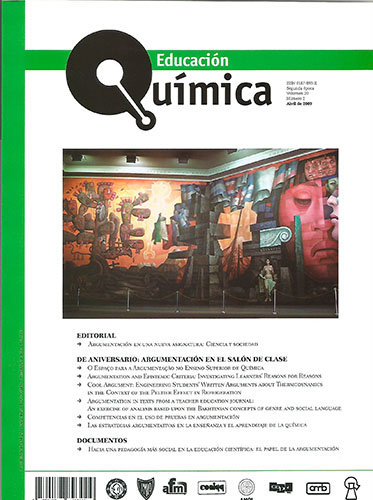Argumentative strategies for teaching and learning chemistry
Main Article Content
Abstract
Any human being has formulated questions for his desire and necessity to know about the natural, social and human reality. In order to investigate in any science, scientists use two methods: an internal one for perceiving the reality, thinking, analyzing, reflecting, argueing and judging, and the other for researching. Both methods are learned by students in interactions with teachers. The internal method consists on the mental operations that we put into motion in all cognitive processes. In the empirical level we have sensations, perceive, memorize, repeat, remember and imagine. In the intellectual level we inquire, relate, analyze, come to understand, express what we have understood, conceive and formulate. In the rational, we reflect, look for and order the evidences, criticize, argue and make judgments on the truth or falsity, certainty or probability, of a statement. All the operations on these three levels are intentional and conscious. To argue is one of the mental operations of the third level. It consists in looking for and presenting data and proofs, to demonstrate and to make something credible (knowledge, problems, results, facts, phenomena,…). In the present article there are some argumentative strategies in chemistry college courses used in the teaching and learning processes of different concepts. In order to facilitate this purpose, a qualitative research (sociolinguistic) was made (Cazden, 1989). The research is based on the cognitive theory of Lonergan (1999). I understand as argumentative strategies the set of mental operations (actions) that unfold in the teaching-learning processes to achieve the students’ understanding and learning. Some of these strategies are to use examples, prosopopoeias, analogies, comparisons, descriptions or repetitions.
Article Details
Citas en Dimensions Service

Educación Química por Universidad Nacional Autónoma de México se distribuye bajo una Licencia Creative Commons Atribución-NoComercial-SinDerivar 4.0 Internacional.
Basada en una obra en http://www.revistas.unam.mx/index.php/req.




